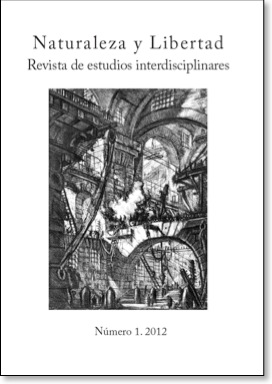La mente mecánica
DOI:
https://doi.org/10.24310/nyl.v1i1.3977Keywords:
filosofía de la mente, intencionalidad, dualismo, maquinas de Turing, Teorema de Gödel,Abstract
Resumen: La mente humana es capaz de razonar, de manera similar que lo haría un ordenador, sobre cuestiones que son formuladas algorítmicamente, pero también es capaz de realizar otras funciones que algunos autores consideran que son imposibles de simular por una máquina. Los diferentes respuestas a cómo funciona la mente han sido abordadas por la filosofía de la mente, la lógica, la psicología y la neurología, incluso hoy en día por la mecánica cuántica. En este trabajo intentaré realizar un compendio de las algunas teorías que han apoyado por un lado la posibilidad, y por otro la imposibilidad, de una mente mecánica.
Palabras clave: filosofía de la mente, intencionalidad, dualismo, maquinas de Turing, Teorema de Gödel.
Abstract: Human mind is capable of reasoning, as much as a computer would do, on issues algorithmically formulated, but it is also able to play other roles which are regarded by some authors impossible for a machine to mimic. The different answers to how human mind works have been addressed by philosophy of mind, logics, psychology and neurology, and nowadays even by quantum mechanics. In this paper I will intend to present an overall review of the several theories that have supported on the one hand the feasibility, and on the other hand the impossibility, of a mechanical mind.
Key words: Philosophy of mind, Intentionality, dualism, Turing machines, Gödel’s theorem.
Recibido: 07/09/2011. Aprobado: 10/12/2012.
Downloads
Metrics
References
Anderson; A. L. (ed), Controversias sobre mentes y máquinas. Barcelona, Tusquets Editores, 1984.
Bechtel, W., La filosofía de la mente, Madrid, Editorial Tecnos, 1991.
Boden, M. (ed.), Filosofía de la Inteligencia Artificial. F.C.E. México, 1994.
Burgos, J. A., La familia del Dr. Frankenstein. Materiales para una historia del hom¬bre artificial, Jaén, Alcalá Grupo Editorial, 2007.
Canseco, J., Redes neuronales y conexionismo en las neurociencias, Abasis, Rivista di filosofía on-line (www.metabasis.it) marzo 2007 año II n°3, p. 6.
Crane, T., La mente mecánica. Introducción filosófica a mentes, máquinas y represen¬tación mental. México, FCE, 2008.
Fodor, J. A., El lenguaje del pensamiento, Madrid, Alianza Editorial, 1984.
Garrido, M., La lógica simbólica, Editorial Tecnos, Madrid, 2001.
Gödel, K., Obras completas. Madrid, Alianza Editorial, 1981.
Goldstein, R., Gödel. Paradoja y vida. Barcelona, Antonio Bosch Editor, 2010.
Gray, Jeremy J., El reto de Hilbert, Barcelona, Editorial Crítica, 2000.
Guijarro, V.; Gonzalez de la Lastra, L., La quimera del autómata matemático, Ma¬drid, Cátedra, 2010.
Hameroff, S.R.; Penrose, R., «Orchestrated reduction of quantum coherence in brain microtubules: A model for consciousness», Neural Network World 5 (5), 1995, págs. 793-804.
Hardy Leahey, Historia de la psicología. Principales corrientes en el pensamiento psi¬cológico, Madrid, Prentice Hall, 1998.
Hierro-Pescador, J., «En torno a la intencionalidad», Revista de Filosofía VIII, 14, 1995, págs. 29-44.
Hofstadter, D.R., Gödel, Escher, Bach. El Eterno Grácil Bucle. Barcelona, Tusquets Editores, 1987.
Hofstadter, D.R., Yo soy un extraño bucle, Barcelona. Tusquets Editores, 2008.
Leavitt, D., Alan Turing. El hombre que sabía demasiado, Barcelona, Antonio Bosch Editor, 2007.
Martínez Freire, «P. Wittgenstein y Fodor sobre el lenguaje privado», Anuario Fi¬losófico (28), 1995, págs. 357-376.
Martínez, G.; Piñeiro, G., Gödel para todos. Barcelona, Seix Barral, 2010.
Moya, C. J. , Filosofía de la mente, Valencia, Universidad de Valencia, 2006.
Nagel, E.; Newman, J.R., Teorema de Gödel, Madrid, Editorial Tecnos, 1994.
Penrose, R., La nueva mente del emperador, Madrid, Mondadori, 1991.
Penrose, R, Las sombras de la mente. Barcelona, Editorial Crítica, 2007.
Pujadas, L., «Intensión, intención, intencionalidad», Taula, Núm. 10 Diciembre, 1988, págs. 29-41.
Raatikainen, P., «On the philosophical relevance of Gödel’s incompleteness theo-rems», Revue Internationale de Philosophie 59:4, 2005, págs. 513-534.
Rumelhart, D. E.; McClelland, J., Introducción al procesamiento distribuido en pa¬ralelo, Madrid, Alianza Editorial, 1991.
Searle, J., Mentes, cerebros y ciencia, Madrid, Editorial Cátedra, 1990.
Searle, J., El misterio de la conciencia, Barcelona, Editorial Paidos, 2000.
Turing, A., «On computable numbers with an aplication to the Entscheidung¬sproblem», Proceedings of London Mathematical Society, vol. 42, 1937, págs. 230-265. Disponible en: http://www.turingarchive.org/browse.php/B/12.
Von Neumann, J., El ordenador y el cerebro, Barcelona, Antonio Bosch Editor, 1999.
Downloads
Published
How to Cite
Issue
Section
License
Those authors who have publications with this journal, accept the following terms:
1. Copyright and licensing information are clearly described on the journal’s web site: all content published in Naturaleza y Libertad is open acces without limit, and are subject to the Attribution-NonCommercial-ShareAlike 4.0 International (CC BY-NC-SA 4.0) license. The full text of which can be consulted at https://creativecommons.org/licenses/by-nc-sa/4.0/
2. It is the responsibility of the authors to obtain the necessary permissions for the images that are subject to copyright. The authors whose contributions are accepted for publication in this journal will retain the non-exclusive right to use their contributions for academic, research and educational purposes, including self-archiving or deposit in open access repositories of any kind. The electronic edition of this magazine is edited by the Editorial de la University of Malaga (UmaEditorial), being necessary to cite the origin in any partial or total reproduction.
3. This journal allows and encourages authors to publish papers on their personal websites or in institutional repositories, both before and after their publication in this journal, as long as they provide bibliographic information that accredits, if applicable, your posting on it.
4. In no case will anonymous papers be published.






18.png)













